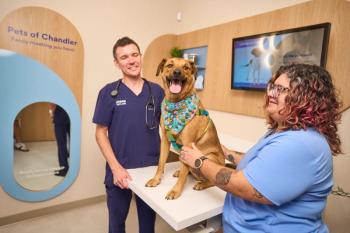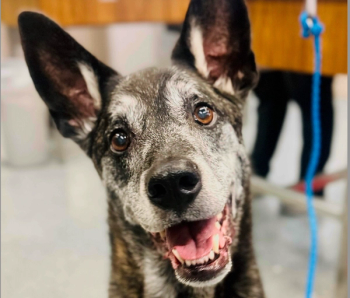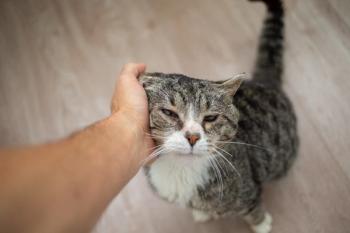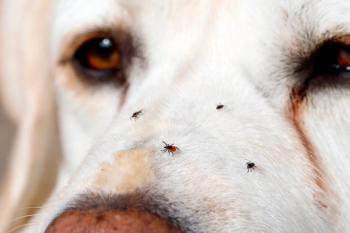
A kitten’s fight against FIP
A 10-month-old kitten survives FIP with 2 recently available medications
Shepard, a 10-month-old kitten is on a journey to recovery from feline infectious peritonitis (FIP) after his brother and littermate, Soot, passed away, likely of FIP, 3 months before Shepard began showing clinical signs of the disease.
Shepard’s treatment was overseen by Katelynn Ondek, DVM, PhD, a veterinary neurology and neurosurgery resident, who explained in a University of Illinois College of Veterinary Medicine report1 how the team at the University of Illinois Veterinary Teaching Hospital in Urbana diagnosed and treated the usually fatal disease before treatment for it—compounded GS-441524—was
Soot and Shepard were both adopted by the same family. In March 2024, Soot began limping on his right rear leg, losing control of his bowel and bladder, and losing interest in eating. As the month progressed, Soot experienced worsening symptoms, including seizures, hypothermia, and bradycardia. He was then taken for emergency treatment, but ultimately euthanized when he could not be stabilized. Definitive diagnostic tests are still pending for Soot, but preliminary results strongly indicate FIP, per the university report.1
Three months later, on July 31, 2024, Shepard began having green nasal discharge and wheezing. After 2 days, he became lethargic and showed a diminished appetite. The following day, Shepard developed neurological signs, including stiff back legs, a wobbly walk, and splaying of his legs. It was at this point that his family took action. According to Ondek, the family's heartbreaking experience with Soot helped them identify Shepard's clinical signs, helping them to get him hospitalized and receive timely treatment.1
FIP manifests in 2 forms: the "dry" or noneffusive type, which may cause neurological issues, and the "wet" or effusive type, characterized by fluid buildup in body cavities. Both Shepard and Soot experienced non-effusive FIP.
Shepard’s diagnosis and treatment
Veterinarians were able to stabilize Shepard after he arrived at the Veterinary Teaching Hospital's emergency room (ER). He was then referred to the neurology and neurosurgery service for diagnostic testing, which involved blood work and an MRI.
“The MRI allows us to look at the gross structures of the brain and spinal cord. In Shepard, it revealed an infection or inflammation of the tissue around his brain and spinal cord [meningitis]. Cerebrospinal fluid analysis lets us look microscopically at the nervous system, and Shepard’s sample was positive for FIP,” explained Ondek in the report.1
The ER began Shepard’s treatment with supportive care and antibiotics. Then, the hospital's neurology team administered a steroid to minimize inflammation in his central nervous system. He also underwent a blood transfusion during his hospitalization.
Remdesivir
However, even with these treatments, Shepard’s health continued to deteriorate until he received a legally-sourced antiviral therapy: the injectable antiviral remdesivir — a treatment for cats with FIP that had recently become available.
Shepard’s case was the first to be legally treated at the university’s Veterinary Teaching Hospital with remdesivir.1 Originally recognized for its effectiveness against COVID-19 in humans, remdesivir received FDA approval for veterinary use in 2022. However, according to Ondek, the treatment has been “nearly impossible” to acquire in veterinary clinics.1 At $775 for a 100 mg vial, the medication is not affordable for many veterinary practices.
“We are very fortunate that we were able to obtain this medication from Carle [Hospital in Urbana, Illinois],” Ondek remarked in the report.1
Within 24 hours of starting remdesivir, Shepard began to improve. By the fourth day of treatment, he was racing around the treatment room, displaying only mild incoordination.
After 8 days in the hospital, Shepard was discharged. Family follow-up videos show that he is now behaving like a typical kitten, though he remains a bit wobbly, according to the report.1
According to Ondek, studies have found that cats that survive the first 2 days are more likely than not to have an 80% or greater chance of long-term survival with antiviral treatments, the report relayed.1
GS-441524
Shepard has since been switched to oral GS-441524, which became available for veterinary use from Stokes Pharmacy in June 2024. “The new compounded oral medication from Stokes, which is identical to the Bova formula used in the UK and Australia, was just legalized in June 2024 and will be a game-changer for veterinary medicine moving forward,” said Ondek in the report.1
Five years ago, FIP was considered fatal. Treatments like remdesivir and GS-441524 have now increased the survival rate to between 50% and 100%.1
The advised length of antiviral treatment is 84 days. There is a chance of relapse during or after this initial period, according to the report.1 Some cats with neurologic FIP may also experience permanent, non-progressive neurological deficits even if they fully recover.1
“Shepard is not out of the woods yet, but we are all rooting for him and will be following him closely over the next few months,” said Ondek in the report.1
Other felines with FIP receive help
Recently, Austin Pets Alive! (APA!), a nonprofit animal shelter and rescue organization in Austin, Texas,
APA! has treated more than 250 cats, primarily FeLV-positive, achieving a 75% survival rate during the 6-month treatment and observation period, with FeLV co-infection seemingly having no impact on FIP treatment outcomes.3
References
- Bryan L. A tale of two kitties: Feline infectious peritonitis. University of Illinois College of Veterinary Medicine. September 13, 2024. Accessed October 10, 2024.
https://vetmed.illinois.edu/pet-health-columns/feline-infectious-peritonitis-remdesivir/ - McCafferty C. Compounded oral FIP treatment is now available. dvm360. September 10, 2024. Accessed October 10, 2024.
https://www.dvm360.com/view/compounded-oral-fip-treatment-is-now-available - Littrell A. Nonprofit shelter collaborates on lifesaving FIP treatment. dvm360. September 4, 2024. Accessed October 10, 2024.
https://www.dvm360.com/view/nonprofit-shelter-collaborates-on-lifesaving-fip-treatment
Newsletter
From exam room tips to practice management insights, get trusted veterinary news delivered straight to your inbox—subscribe to dvm360.






